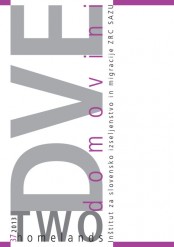From a Plate of Mixed Appetizers toward a Melting Pot? Academic Debates on China’s Current Ethnic Policies
Keywords:
Chinese ethnic policies, ethnic autonomy, preferential policies, Ma Rong, depoliticizationAbstract
Large-scale ethnic unrest in recent years has instigated heated debates among Chinese intellectuals as well as the wider public about the suitability of current PRC ethnic policies. This article is an attempt at an introductory critique of the views of certain notable academics on this issue. A brief outline of the development of Chinese ethnic policy in the 20th century is followed by an overview of the arguments of sociology professor Ma Rong, the main proponent of abolishment of ethnic minority rights. The views of those who support the current policies are then briefly summarized. The article concludes with a critical examination of both positions, expressing support for the introduction of proper self-governance.
Downloads
References
Bofulin, Martina (2010). Popotovanje harmonije? Odnos kitajske države do izseljencev. Razprave in gradivo: revija za narodnostna vprašanja/Treatises and Documents: Journal of Ethnic Studies 61, 120–150.
Chen, Jianyue (2005). Duominzu guojia hexie shehui de goujian yu minzu wenti de jiejue: Ping minzu wenti de “qu zhengzhihua” yu “wenhuahua” (The Construction of a Harmonious Multiethnic/national State and the Solution of the National Question: A critique of the ‘politicization’ and ‘culturalization’ of ethnic issues). Shijie minzu 5, 1–13.
China’s Ethnic Policy and Common Prosperity and the Development of All Ethnic Groups 2009 (State Council Whitepaper), http://www.china.org.cn/government/whitepaper/node_7078073.htm (10 Nov. 2012).
Fei, Xiaotong (1989). Zhonghua minzu de duoyuan yiti geju (The Pattern of Plurality in the Unity of the Chinese Nation). Beijing daxue xuebao (Zhexue shehui kexue ban) 4, 1–19.
Halskov Hansen, Mette (2005). Frontier People: Han Settlers in Minority Areas of China. London: Hurst & Co.
Harrell, Stevan (1995). Introduction: Civilizing Projects and the Reaction to Them. Cultural Encounters on China’s Ethnic Frontiers (ed. Stevan Harrell). Seattle, London: University of Washington Press, 3–36.
He, Baogang (2005). Minority Rights with Chinese Characteristics. Multiculturalism in Asia, (eds. Will Kymlicka, Baogang He). Oxford: Oxford University Press, 56–79.
Hao, Shiyuan (2005). Jiangou shehuizhuyi hexie shehui yu minzu guanxi (The Construction of a Harmonious Chinese Society and Ethnic Relations). Minzu yanjiu 3, 1–14.
Howland, Douglas (2011). The Dialectics of Chauvinism: Minority Nationalities and Territorial Sovereignty in Mao Zedong’s New Democracy. Modern China 37/2, 170–201.
Hu, Angang, Hu, Lianhe (2011). Di er dai minzu zhengce: cujin minzu jiaorong yiti he fanrong yiti (The Second Generation Ethnic Policies: Toward Integrated Ethnic Fusion and Uniform Prosperity). Xinjiang shifan daxue xuebao (Zhexue shehui kexue ban) 32/5, 1–12.
Leibold, James (2012). Can China Have a Melting Pot? China Power (The DIPLOMAT Blogs), http://thediplomat.com/china-power/can-china-have-a-melting-pot/ (5 Dec. 2012).
Ma, Rong (2000). Guanyu minzu de dingyi (On the Definition of minzu). Yunnan minzu xueyuan xue bao 1.
Ma, Rong (2004). Lijie minzu guanxi de xin silu: shaoshu zuqun wenti de ‘quzhengzhihua’. (A New Perspective in Understanding Ethnic Relations: The ‘Depoliticization’ of the Ethnic Minority Issues/ Question). Beijing daxue xuebao (Zhexue shehui kexue ban) 41/6, 122–133.
Ma, Rong (2007). A New Perspective in Guiding Ethnic Relations in the Twenty-First Century: The ‘Depoliticization’ of Ethnicity in China. Asian Ethnicity 8/3, 199–217.
Ma, Rong (2009). The Key to Understanding and Interpreting Ethnic Relations in Contemporary China. DevISSues 11/1, 18–20, http://www.iss.nl/fileadmin/ASSETS/iss/Documents/DevISSues/DevISSues11_1_May_09_web_final_01.pdf.
Ma, Rong (2010). Zhongguo shehui de ling yi lei ‘eryuan jiegou’ (Another Type of ‘Dual Structure’ in Chinese Society). Beijing daxue xuebao (Zhexue shehui kexue ban) 47/3, 93–103.
Mackerras, Colin (2003). China’s Minorities and Globalisation. London: RoutledgeCurzon.
Mullaney, Thomas S. (2011). Coming to Terms with the Nation: Ethnic Classification in Modern China. Berkeley, London: University of California Press.
NBSC (National Bureau of Statistics of China) (2011). 2010 nian di liu ci quanguo renkou pucha zhuyao shuju gongbao (di 1 hao) (The 2010 Sixth National Population Census Main Data Communique (No. 1), http://www.stats.gov.cn/tjgb/rkpcgb/qgrkpcgb/t20110428_402722232.htm (29 Dec. 2012).
Regional Ethnic Minority Law (REML) (1984), http://cecc.gov/pages/virtualAcad/index.phpd? showsingle=9507 (15 Mar. 2009).
Sautman, Barry (2010). Scaling Back Minority Rights? The Debate about China’s Ethnic Policies. Stanford Journal of International Law 46/1, 51–120.
Stalin, J. V. ([1913]1949). Marksizem in nacionalno vprašanje. Ljubljana: Cankarjeva založba.
Tapp, Nicholas (2002). In Defence of the archaic: A Reconsideration of the 1950s Ethnic Classification Project in China. Asian Ethnicity 3/1, 63–84.
Veselič, Maja (2011). Managing Religion in Contemporary China: The Case of Islam. Razprave in gradivo: revija za narodnostna vprašanja/Treatises and Documents: Journal of Ethnic Studies 65, 114–137.
Wang, Ke (2001). Minzu yu guojia: Zhongguo duo minzu tongyi guojia sixiang de xipu (Nation and State: A Genealogy of the Thought on a Uniform Multiethnic Chinese State). Beijing: Zhongguo shehui kexue chuban she.
Wang, Shaoguang (2008). Changing Models of China’s Policy Agenda Setting. Modern China 34/1, 56–87.
Wang, Yingguo (2009). Zhongguo bixu binqi qian Sulian de minzu zhengzi. Zongguobaodao zhou kan 11 July 2009, http://www.china-week.com/html/5172.htm (27. Oct. 2012).
Zhu, Xufeng (2011) Government Advisors or Public Advocates? Roles of Think Tanks in China from the Perspective of Regional Variations. The China Quarterly 207, 668–686.
Downloads
Published
How to Cite
Issue
Section
License

This work is licensed under a Creative Commons Attribution-NonCommercial-NoDerivatives 4.0 International License.
Authors guarantee that the work is their own original creation and does not infringe any statutory or common-law copyright or any proprietary right of any third party. In case of claims by third parties, authors commit their self to defend the interests of the publisher, and shall cover any potential costs.
More in: Submission chapter





